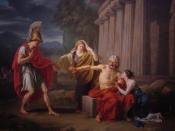The Tragic Hero's Flaw According to Aristotle, characters in a tragedy must have a tragic mistake, or "hamartia,"� associated with them to be considered the tragic hero. Erlich states in the Packet, "in a well-constructed tragedy major characters' "ÃÂfates' should be related to their character: who they are. Very often this will mean some failing, some flaw"� (129). Central to this theory is the classical Greek tragedy Oedipus The King by Sophocles. The tragic hero is Oedipus, whose tragic flaw is intense stubbornness, which causes his world to crash down on top of him in the end.
Oedipus comes to Thebes to hide from a disastrous and incestuous fate proclaimed to him and is made king, having answered the riddle of the sphinx, thereby proving his great wisdom. When he learns of the late kings unavenged murder as the cause of a plague on his people, Oedipus vows to bring justice and find the killer.
What he does not know is that he is the killer, and he is warned several times to let the matter rest, and walk away while he still can. Teiresias the blind prophet begs him, "Send me away I tell you! Then it will be easy for you to play the king, and I the priest"� (196).
Yet he pays no heed to these warnings, and threatens the prophet, because he is stubborn and has vowed to know the truth. "Teiresias! You do not turn away if you know the truth"æI see now that you conspired to plan this murder, and you committed it"æ"� (197).
The brother of Oedipus, Creon, later warns him of his willful mind. "You are stubborn, Oedipus, your will is too hard; it is nothing to treasure, and you are wrong to think it is"� (204). Again these warnings are...


